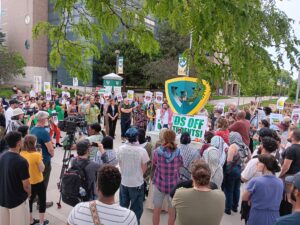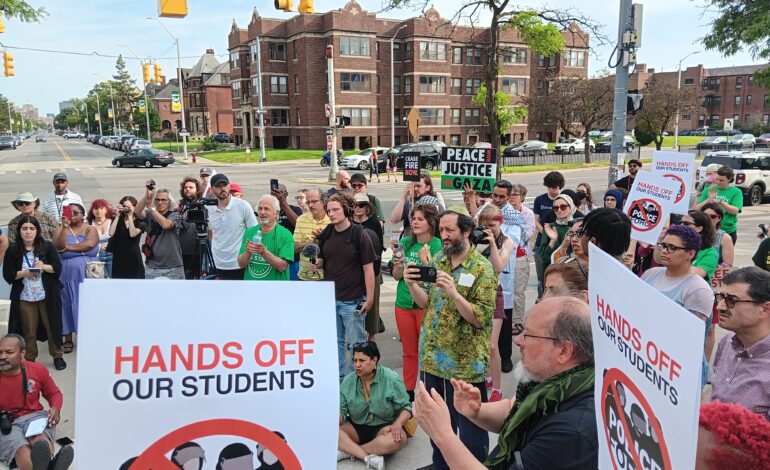DETROIT – Dozens of professors, employees, alumni and students at Wayne State University protested on Tuesday evening against the forced removal of a student encampments and the dispersal of the pro-Palestinian protest on Thursday, May 30. An open letter sent to the university’s administration and Board of Governors asked them to apologize for the repressive police actions that resulted in the arrest of 12 individuals, including members of the organization Students for Justice in Palestine (SJP).
The letter, signed by more than 180 professors and staff at WSU, called on the administration and the Wayne County Prosecutor’s Office not to press charges against the arrested students and to exempt them from any potential academic punishments. It also urged calming the atmosphere on campus and returning to the negotiating table with activists from SJP and the newly established organization Faculty and Staff for Justice in Palestine (FSJP), which supports student activities demanding the university divest from companies investing and cooperating with the Israeli government.
The protesters demanded an end to the genocide in Gaza. The letter urged Wayne State University President Kimberly Andrews Espy to “take hands off the students” and allow them to exercise their right to “freedom of expression and peaceful assembly,” as guaranteed by the U.S. Constitution and the long-standing university traditions.
The letter reflected deep dissatisfaction with the administration’s ongoing refusal to meet students’ demands to halt investments in companies “profiting from the war on Palestinians in Gaza.” It called on university officials to intervene to stop the legal prosecution of peaceful activists recently detained, including “six current students, a new student, a family member of a student and at least one legal observer.”
“The use of force against students who peacefully defend their beliefs is unacceptable and contradicts the values of our academic community,” said Dr. Morhaf Al-Ashqar, an associate professor at Wayne State’s School of Medicine. He said he strongly believe that the university’s repressive measures would not deter students from continuing their legitimate demands and peaceful anti-war activities.
The letter also urged the administration and Board of Governors to reopen dialogue with SJP representatives, as well as representatives from FSJP, and allow them to protest against the ongoing genocide in Gaza for the ninth consecutive month.
Dozens of heavily armed police officers raided the student encampments at Wayne State University around 5:30 a.m. on May 30, after the administration claimed the protesters refused to come to the table for dialogue with university officials. The administration also alleged that the student encampments posed a threat to public safety and campus inclusiveness, citing concerns raised by some Jewish students and faculty members about their personal safety.
The encampments at Wayne State are a part of a national movement pressuring American universities to divest and sever academic ties with the state of Israel, resulting in the arrest of more than 3,000 students nationwide in the past two months.
The letter, read amid applause from protesters near the Welcome Center, stated, “We stand in solidarity with the students and all those affected by the blatant disregard for freedom of expression and assembly and the legitimate attempts to engage the university administration in student demands.” It emphasized the importance of ensuring the safety and rights of students and upholding the principles of justice and fairness within the university as academic facilities thrive through the active exchange of ideas.
Al-Ashqar listed the protesters’ demands, including divestment from companies connected to Israel, full disclosure of the university’s investments in the apartheid state, ending cooperation between Wayne State police and Israeli Occupation Forces, demilitarizing the campus and the university issuing a statement calling for a ceasefire in the Israeli war on Gaza.
“The university administration thought it would intimidate and silence us by arresting and harassing students, but they didn’t realize that behind these brave students, there are many people who came today to say ‘take your hands off our students,'” the letter concluded.
The protest included more than 200 people from various ethnic backgrounds, many wearing Palestinian keffiyehs, and some Jewish student activists carrying signs condemning ethnic cleansing in occupied Palestine, with messages such as “Not in our name.” They disassociated themselves from the crimes committed by Israel that have resulted in the deaths of approximately 40,000 people, mostly children and women, since last October.

Protesters on WSU’s campus hold signs calling for divestment from Israel after the removal of the encampment.
Student Lana Kadi, 22, said that students have the right to organize and engage in registered campus organizations, noting that dismantling the student camp and using excessive police force against activists constitutes a violation of individual and group rights and university organizations.
“Our organization is supposed to be protected by university policies, which requires the university administration to protect students from unfair treatments, but it did not do so,” she said.
Kadi, an environmental science student and an SJP member of Syrian descent, asserted that the use of riot gear against peaceful students under the guise of security concerns, without any proof of such concerns, reveals the racial biases of the university administration. She questioned whether the administration would take such measures if the protesters were not Arabs, Muslims or other people of color.
She told The Arab American News that setting up the sit-in camp was a response to the university’s repeated refusal to engage in dialogue with students and the academic officials’ reluctance to find a satisfactory solution between the parties.
“Our initiatives were always met with silence, lies and belittlement, and the university spread false information about its good faith efforts,” she said, adding that the students’ decision to establish the encampments was a necessary step due to “the university’s disregard for our demands and its continuous silence over the past months.”
Kadi called on students and the academic community at Wayne State to continue demanding the university “adhere to its declared values of diversity and inclusion”, to keep pushing for divestment from companies supporting Israel and to avoid prosecuting or academically punishing students detained during the dismantling of the encampments.
Following the protest in front of the WSU Welcome Center on Warren Ave. in Midtown, the demonstrators marched through the campus, raising slogans supporting Palestinian rights, including “Free Palestine” and “45,000 dead, Wayne State University… your hands are stained with blood”, in reference to the human losses in Gaza over the past eight months.
Abraham Aiyash, Democratic Majority Floor Leader of the Michigan House of Representatives, joined the protest, delivering a brief remarks expressing solidarity with the students and harshly criticizing the university’s response to the student protests and the encampments on May 23.
“You have students, employees and faculty members who want to have a conversation about genocide, but there are people in the administration more angered by student tents than by the tents of refugees being bombed by Israel in Gaza,” Aiyash told administration officials.
He condemned the university’s measures to disperse the student sit-in, stating that instead of them feeling frustrated and unleashing the police to assault students on campus, they should have felt frustrated by all the universities that have been erased from this planet in Gaza.
Assistant Professor of Education Thomas Bedroni, 57, said that the university’s decision to remove the student encampments was not fair, refuting the administration’s safety concerns. He told The Arab American News that the student encampments did not cause any incident or problem during the week it was established.
He also pointed out that dispersing the students protest was not just a “maneuver” by the university administration to end the encampments, saying that the administration had already decided to call the police to intervene, claiming the students refused to engage in dialogue.
“What the administration says is not true,” he said “…Their demands were unrealistic as the students needed some time to organize their affairs and the administration did not give them time and instead rushed to dismantle the camp.”
Bedroni described the student encampments at Wayne State as one of the “safest” camps.
“The students took their responsibilities seriously, and for a whole week we did not witness any incident in the camps, which was visited by families and other visitors from outside the campus,” he said.
Chloe Landine, a WSU employee who participated in the protest, told The Arab American News that the university didn’t adhere to policies and traditions guaranteeing students freedom of expression and political activity. She said she had filed a lawsuit against the university in recent months after her supervisor demanded she resign for putting up posters condemning genocide in Gaza on her office door.
“I hung those posters on my office door, but that angered my direct supervisor, who demanded I remove them,” she said. “When I asked if I could hang them inside my office, he asked me to resign.”
Landine, who participates in all anti-war activities, said that, for legal and procedural reasons, she had to submit her resignation out of fear of being fired. However, after consulting with her lawyer, she later filed a lawsuit against the university and her direct supervisor, whose identity she preferred not to disclose to avoid any potential liabilities in this matter.






Leave a Reply